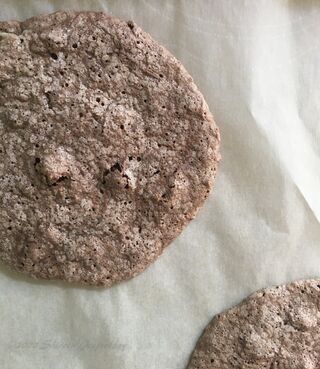Grief
Acceptance in Healing Brain Injury Grief
Personal Perspective: Restoring baking requires treating both neurons and grief.
Posted August 29, 2022 Reviewed by Gary Drevitch

Easter 2003, three years after my brain injury. I was baking my annual hot cross buns for my parents. Or trying to, as I related in my memoir Concussion Is Brain Injury: Treating the Neurons and Me:
“I popped [the buns] in the oven and prayed that I would not, as usual, take them out before they were fully baked. I knew how to bake — I’d been baking bread for decades — yet since my brain injury, the hollow sound I thought I could hear as I tapped the bottom of the buns would often prove false.…I was no longer the Shireen who travelled to her parents, who visited kith and kin, who baked the birthday cakes, who hosted parties and cooked multi-course dinners, who wrote for two hours straight and jumped up after to make omelettes and pizzas, whose self-discipline trampled tasks into submission, and who held appointments, phone numbers, faces, names, facts in her head and linked them up effortlessly to create new concepts….Grief built a wasp’s nest in me. [In 2015] I stopped baking. Another loss in the vast valley of losses.”
Losing my baking was like being skinned. As I wrote here in 2019, “It was the blue Easy Bake Oven that introduced me to the heroin of baking.” Brain injury not only damaged my skill, but the years that followed also broke my self-confidence and burnt up the reason for baking — sharing good food with others. But that year, I felt an urge to try baking bread. Something that wouldn’t overwhelm my recovering neurons.
I’d regained much brain function in the four years between when I gave up baking and when I tried to bake again. Concentration, working memory, processing speed, and the ability to think were just some of the necessary brain functions that treatments had sufficiently restored in me to try baking one loaf.
I discovered I no longer needed instructional Post-It notes, one step per note, neatly lined up along the bottom of my cupboards. I no longer needed to pace. Treatments had reduced my impatience to manageable levels. But I still needed a simple recipe that wouldn’t take long.
“The moment I poured hot milk onto the dry ingredients, the intoxicating scent of bread dough rose and hit all my olfactory cells, sending signals of joy that dried my tears and closed my eyes in ecstasy. No wonder men have taken up bread baking.”
The loaf rose. It baked well. But I told no one, writing only about it on my blog, because the fully alive grief sank spoken words. I’d forced myself to like baking a simple loaf when I really wanted to bake croissants. I didn’t know at the time if it was a one-off blip or the return of my baking.
It was a one-off blip.
I hadn’t healed my brain injury grief nor the trauma of losing my role as the baker—the go-to person who baked birthday cakes and rolls for holiday feasts. I hadn’t reconciled myself to how my baking now manifests itself nor reconciled with parts of my pre-injury self returning.
Since that setback, I’ve worked on healing my grief over lost relationships and lost skills. This year, I’ve been writing a self-help book for people alone with brain injury who want to heal from their injury, trauma, and grief. Thinking about what worked for me, and crafting those activities into formal action plans while reading The Grieving Brain and What Happened to You? for research and understanding, continued the healing process in me. When my oven died several months ago, I felt I’d already put baking behind me so it was no big deal other than I couldn’t heat frozen pizza anymore. I focused on my writing and reading practice. Then recently, I received the gift of a new induction range with convection oven.
My brain likes challenges. Because of years of neurostimulation and neuromodulation, my neurons continue to regrow and rewire spontaneously, especially when faced with a difficult task. I had no idea how to cook with induction or convection; the challenge grabbed my attention. Suddenly, I wanted to bake.
I spent weeks thinking about what to cook first, what to bake first. Firsts, for me, are important. This new range marked another goodbye — a goodbye to an oven that had witnessed feasts and multi-layer cakes and birthdays and a wedding cake, to a past that’s no longer my present. The new range marked accepting my baking for what it is, in this moment. As part of the gift, I bought new pans and pots and threw out the old. Throwing out my decrepit non-stick bakeware was another step in healing my grief, in telling myself that my desires matter, including the desire for stainless steel and glass bakeware. This action enabled accepting my present for what it is.
I baked chocolate walnut meringue cookies, a recipe I kind of made up, as my first bake. I think I under-baked them, for they were sticky. Yet I found myself eating another and another. My reaction told me I liked this new convection baking. Maybe this baking moment wasn't a blip. Several days later, I baked a chocolate cake—a simple square-pan, one-bowl cake reminiscent of my go-to recipe through childhood and adolescence.
Mary-Frances O’Connor wrote in The Grieving Brain, “I use accepting for one’s response to what happens in the moment, rather than acceptance, which suggests a permanent change in how a situation is viewed….But when accepting comes, it brings a certain sort of peace with it.”
I found myself accepting this naked cake and feeling a peace about it. I’d reconciled with my resurrected baking talent returning within a very different life because I’d received treatment that had healed the required neurons and because I’d grieved the loss and associated trauma.
Copyright ©2022 Shireen Anne Jeejeebhoy




